

Future of the UK and Scotland: The Referendum Debate. Kicking the hinges off. Some recent comments of mine about how the UK government and European Union wouldn’t – because they couldn’t – strip citizenship from anyone in the event of a Yes vote in the independence referendum brought dissenting responses on Twitter from a few folk who certainly know a thing or two about government.

Their primary arguments were so weak, though, that coming from such able individuals they exemplified how much the establishment is being forced to state obvious untruths in defence of an otherwise perfectly legitimate line of argument. But does politics really have to be this dishonest? So, sure, Scottish secession from the UK might make things a little trickier for countries like Spain, France and Belgium who have their own secessionist issues.
But so what? How would the UK and EU look to the world, notably the US and UN, (and Russia, btw, which gave citizens in seceding countries a choice of retaining their Russian citizenship) if they said to millions of citizens: No Way Jose. Scotland is not Kosovo. Rarely have I found myself left speechless by the comment of a politician, but the Jose Manuel Barroso’s attempt to compare Scotland with Kosovo left me in a state of spluttering incoherence.
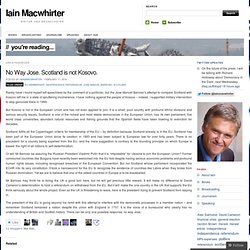
I have nothing against the people of Kosovo – indeed, I supported military intervention to stop genocide there in 1999. But Kosovo is not in the European Union and has not even applied to join. It is a small, poor country with profound ethnic divisions and serious security issues. Scotland is one of the richest and most stable democracies in the European Union, has its own parliament, five world class universities, abundant natural resources and fishing grounds that the Spanish fleets have been trawling to extinction for decades. The Day After. Something annoyed us a great deal this week, and for once it wasn’t some fatuous statement from Alistair Darling or Alistair Carmichael or Ruth Davidson (though all of those were in plentiful supply too).

Rather, it was a comment from a distinguished academic and professional in what was otherwise a good-news story. The chap in question was Patrick Layden QC, former Deputy Solicitor to the Scottish Executive (as was), prior to giving evidence to Holyrood’s European and External Relations Committee, and the quote published in several papers was a troubling one. “It seems now to be generally agreed that an independent Scotland would no longer be within the European Union and that amendments to the EU treaties would be required to admit Scotland to the EU,” he said.
“In that regard I note Sir David Edward’s query as to whether the correct legal analysis might not lead to the conclusion that both Scotland and RUK would effectively cease to be member states. Just a second, cowpoke. No Way Jose. Scotland is not Kosovo. Non, mes amis. Thursday, 28 November 2013 23:57 By Derek Bateman The good thing about forcing an issue is that you find out who your friends are.
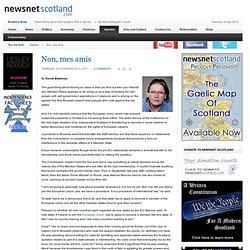
Mariano Rajoy appears to be using us as a way of beating his own people with self government aspirations in Catalonia and is relying on the agreed line that Brussels doesn't want people who vote against the big states. Scottish independence: Scotland could join EU in 18 months, says expert. Scotland’s relationship with Europe.
Scotland has always been an outward looking nation.
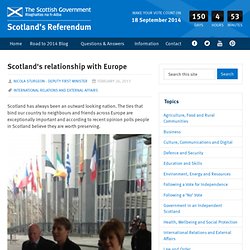
Scotland's EU bombshell? It's bunkum from Barroso. Some brief facts about the EU. Unionists are very excited this afternoon about the latest development in the EU membership debate. A BBC interview with European Commission president Jose Manuel Barroso repeated the assertion (or rather, the deduction from an implication) that an independent Scotland would have to apply for entry to the European Union as a new state. We’ll limit ourselves to a few factual observations. 1. The interviewer sought Barroso’s opinion on a hypothetical and non-specific proposal about a part of a member state becoming an independent country, and he answered the question he was asked.
The question was a leading one based on the premise that Scottish independence would be an act of secession, and that England (and Wales and Northern Ireland) would retain “UK” status. 2. There are simply no legal or political grounds on which Scotland could be regarded as a new state and the rUK as a continuity state, and contrary to media assertions Senor Barroso did not say that there were. 3. 4. 5. 6.
Calum Cashley SNP. Five reasons Scotland shouldn't panic about staying in the EU. Scots would remain EU citizens. Jose Manuel Barroso, the president of the European Commission, has said that in the event that Scotland votes for independence in 2014 then the new state of Scotland would have to apply for EU membership all over again. Well, I hope Scottish residents vote to stay in the UK and I think the possibility that they may not is mainly media and political hype. But I’d hate to see the kind of tosh we’re being treated to today become central to what should, after all, be a serious debate.
If Scotland votes for independence then are residents of Scotland going to lose their UK citizenship? No, of course not. You can’t be stripped of your citizenship just because you’re resident abroad and in any case there’d be no way for a ‘residual UK’ to distinguish between ‘Scots’ and ‘people just living in Scotland for now’. Never mind Scotland, will there be a UK in Europe? There might not be an European Union for an independent Scotland to remain a part of if the eurozone debt crisis leads to a fracture between Germany and the rest.
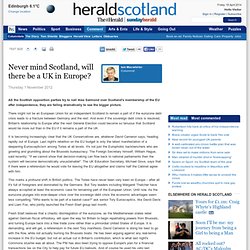
And even if the sovereign debt crisis is resolved, Britain's relationship to Europe after the next General Election could become so tenuous that Scotland would be more out than in the EU if it remains a part of the UK. It is becoming increasingly clear that the UK Conservatives are, whatever David Cameron says, heading rapidly out of Europe. Last night's rebellion on the EU budget is only the latest manifestation of a deepening Euroscepticism among Tories at all levels. Scotland’s Place in the World and the Problem with British Isolationism. Scotland’s Place in the World and the Problem with British Isolationism Gerry Hassan The Scotsman, November 3rd 2012.
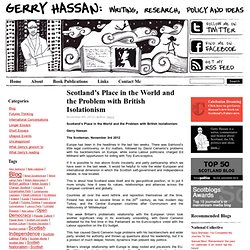
Jim Sillars: Market forcing the independence issue. SALMOND and the SNP must address core questions before the independence vote, including fiscal control and access to vital trade within Europe, writes Jim Sillars A few weeks ago, in this newspaper, Bill Jamieson asked a reasonable question – what is it that the SNP government wants to do with the sovereign powers it is asking us to vote for in 2014?
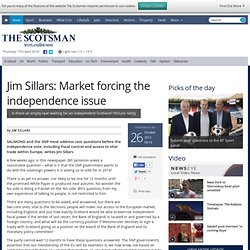
There is as yet no answer, nor likely to be one for 12 months until the promised White Paper is produced next autumn. No wonder the No side is doing a Frankel on the Yes side. Bill’s question, from my own experience of talking to people, is not restricted to him. The party cannot wait 12 months to have these questions answered. They are correct. HC 643 The foreign policy implications of and for a separate Scotland (17th October 2012) Graham Avery, Senior Member of St.
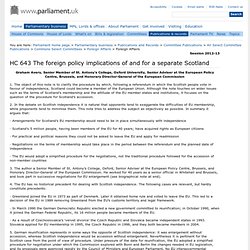
Antony’s College, Oxford University, Senior Adviser at the European Policy Centre, Brussels, and Honorary Director-General of the European Commission 1. A ready and willing member state. Scotland would be a proud and constructive part of the EU.

This article is reserved for paying subscribers... Select your offer today and receive: Please log in to read this article: Calum Cashley SNP: Busting an EU myth. A Quarrel in a Faraway Country?: Scotland, Independence and the EU. Aidan O’Neill QC. Nicholas Tsagourias: Getting a seat at the big table might be tricky for Scotland - Cartoon.